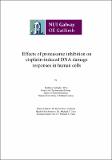| dc.description.abstract | The proteasome is the main site of protein degradation in human cells, and plays
a major role in the regulation of cellular processes including cell cycle
progression, DNA repair and the DNA damage response. Proteasome inhibition
is emerging as a new anti-cancer strategy, with the development of bortezomib
for the treatment of patients with multiple myeloma. Proteasome inhibitors can
be used either as single agents or in conjunction with other cancer treatments.
Proteasome inhibitors can sensitise cancer cell lines to routinely-used cancer
treatments including the platinum-based anti-cancer drug, cisplatin. The aim of
this research was to investigate the effect of proteasome inhibition on cisplatininduced
DNA damage responses in human cells, including cell viability, cell
cycle arrest and the phosphorylation of DNA damage response proteins.
The proteasome inhibitor MG132 sensitised the pol n-deficient human fibroblast
cell line XP30RO to cisplatin. MG132 treatment induced strong cell cycle arrest,
and prevented cisplatin-induced accumulation of XP30RO cells in S phase. As
determined by western blotting, proteasome inhibition alone did not induce
phosphorylation of the DNA damage response proteins, H2AX or Chk1.
However, a novel phosphorylated form of the RPA2 subunit the trimeric, singlestranded
DNA binding protein replication protein A (RPA), RPA2-pS4S8* was
identified in MG132-treated cells. RPA2-pS4S8* is phosphorylated but is not
hyperphosphorylated, based on gel mobility and western blotting following SDSPAGE.
RPA2-pS4S8* induction is independent of DNA damage but dependent
on proteasome inhibition and was detected in all cell lines examined. Cotreatment
of cells with MG132 did not alter levels of cisplatin-induced yH2AX,
pChk1 or RPA2-pS4S8. Removal of cisplatin and MG132 led to the
identification of novel, slow mobility forms of RPA2 by western blotting.
Western blotting analysis, using an anti-ubiquitin antibody, of RPA2
immunoprecipitated from native and denatured cell extracts following provided
evidence that slow mobility forms of RPA2 represented ubiquitinated forms of
RPA2. The dependence of FANCD2 monoubiquitination on pol ¿ was also
investigated. FANCD2 is required for the repair of ICLs. Results showed an increase of FANCD2 monoubiquitination in pol n-deficient cells compared to pol
¿-proficient cells.
In this study two novel forms of RPA2 have been identified: a DNA damageindependent
RPA2-pS4S8* and DNA damage-dependent form which is
consistent with ubiquitination of RPA2. These novel forms of RPA2 may be
important in regulation of the cellular functions of RPA. This provides new
insights into the relationship between proteasome function and the DNA damage
response, in particular following cisplatin treatment. | en_US |


